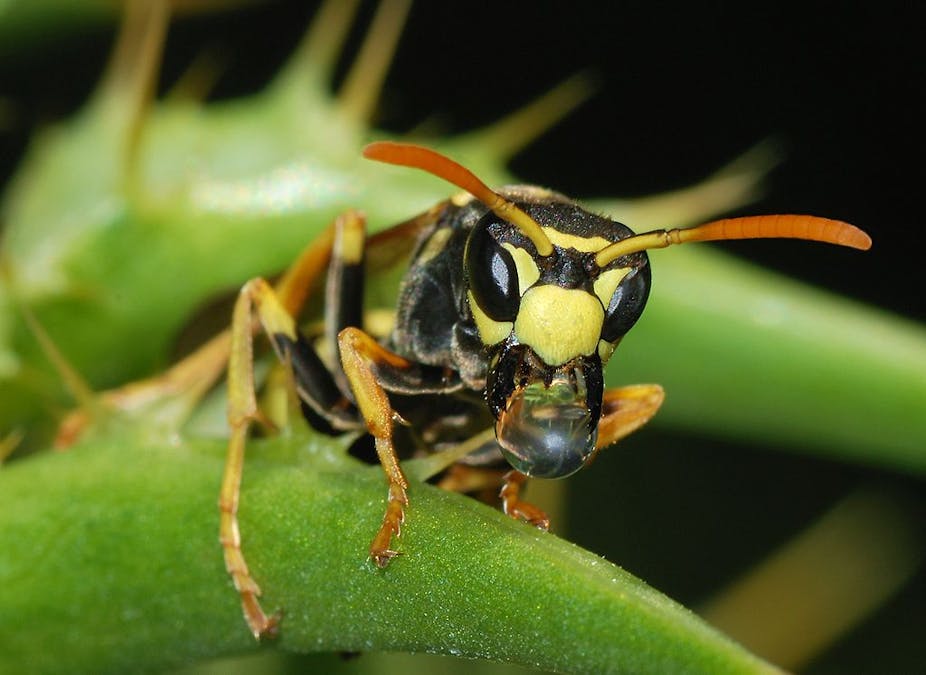Recently a newspaper asked its readers to propose species that were, ecologically speaking, “useless”, such that their loss would not have any great knock-on effect on other species or biological cycles. And what did they choose to illustrate this question with? A wasp - which, along with stinging nettles and dog dirt are pretty much the only appreciable natural hazards in the British Isles.
Like many other species of the order Hymenoptera, these insects have modified ovipositors that no longer lay eggs but instead sting. While bees either make honey or look fluffy and bumbling, these black and yellow wasps seem to do nothing but ruin whatever weather passes for a British summer by pestering picnics and dive-bombing barbeques.
Getting stung by a wasp is not a great deal of fun. For an unlucky few it can even be life-threatening if they experience an extreme immune system reaction to the venom and enter anaphylactic shock. In some regions some wasps are considered invasive species, which have in a relatively short period of time wrought havoc on native ecosystems.
But I want to consider our attitudes to these species in their native habitats. I want us, in short, to love wasps - for two reasons.
First, wasps are not useless but in fact very important elements in complex ecosystems. Adult wasps feed on nectar and sweet fruit (and possibly your unattended soft drink or beer as they will be attracted to its strong smell). By feeding on nectar, wasps are pollinating species. But it is the feeding requirements of their larvae that produce arguably more important ecological effects as their larvae only eat solid food. Consequently, a great deal of an adult wasp’s time is spent searching for species that we consider pests: aphids and caterpillars that eat the plants that we want to eat, or like to admire.
To answer the question of what purpose wasps play, one could do much worse than consult Alfred Lotka’s ground breaking work on mathematical biology. Lotka captured some of the myriad interactions between species in a series of elegant equations and showed the complex ecosystem-level behaviour that could result. It would be practically impossible to predict the impact of the extinction of even a single species of wasp on the many other creatures and plants it interacts with, directly or indirectly.
The second reason why we should love wasps I come to by way of analogy.
I can only speculate what The Right Honorable Theresa May did on the evening of 7th July 2013 - perhaps enjoy a glass of wine with her feet up on a Home Office desk while savoring Abu Qatada’s final journey from the UK to Jordan. Qatada first came to the UK in 1994, and was convicted in absentia by a Jordanian court in 1999 for conspiracy to carry out terrorist attacks. Although never charged, he was imprisoned for periods in the UK under anti-terrorism laws in response to evidence that he had links to terrorists networks such as al-Qaeda.
The British government started proceedings to deport Qatada to Jordan in 2002, and these continued in a torturous fashion for more than a decade through various court rulings and challenges to those rulings. He was a thorn in the side of successive Home Secretaries and a focal point for those that questioned the priorities and even sanity of the legal system. Estimates of the costs borne by the taxpayer range from £500,000 to £3m.
Why should we care about Qatada’s legal rights? Why go to such trouble, time and expense to ensure that when he was deported it was done in strict accordance to the law?
Because by respecting Qatada’s rights and according him due process we can be sure our rights will be respected too. Some of the rights we enjoy in the UK have been literally fought for. The moment you qualify them, judge their applicability in terms of how worthy their holders are, you undermine their entire basis.
And so to wasps. They may be a nuisance, to some even life threatening. But if we value them and give them due process and consideration, then we should be in a much better position to consider the very large number of other species that we directly benefit from such as bees pollinating crops or trees stabilising slopes and reducing flooding.
Until recently, we have simply taken for granted that the other species we share the Earth’s biosphere with contribute greatly to our well being. In an important way, these hidden benefits are very much like rights - you only notice how vital they were after they are taken away.

